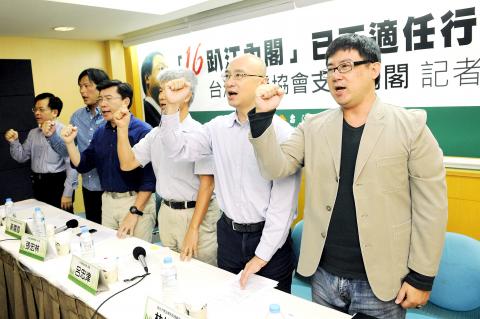The no-confidence motion initiated by the Democratic Progressive Party (DPP) and the Taiwan Solidarity Union against the Cabinet is the right thing to do not only because the latter has been incompetent and is involved in an ongoing political dispute, but also because the Legislative Yuan no longer represents mainstream public opinion, academics told a press conference yesterday.
Several professors from the Taiwan Association of University Professors (TAUP) called on the public and Chinese Nationalist Party (KMT) legislators to support the motion, which is to be put to a vote tomorrow and which the professors said is “more of a constitutional issue than a competition between political parties.”
Citing the latest public opinion poll conducted by Taiwan Indicators Survey Research, which showed that Premier Jiang Yi-huah’s (江宜樺) approval rating was a dismal 15.8 percent, TAUP President Lu Chung-chin (呂忠津) said that Jiang “has lost the public’s trust and is unqualified for the post.”

Photo: Chen Chih-chu, Taipei Times
The premier has played a major role in the current political turmoil — initiated by President Ma Ying-jeou (馬英九) through his attempt to remove Legislative Speaker Wang Jin-pyng (王金平) — and under him, the Cabinet has not only abused policing powers and human rights, but also signed the cross-strait service trade agreement without consulting the public, the association said.
As it would be difficult to impeach or recall the highly unpopular Ma under the current constitutional mechanisms, the only way to hold the president accountable for his actions is to force the premier — a de facto executive director under Ma in Taiwan’s semi-presidential system — to step down, National Chengchi University law professor Lin Chia-ho (林佳和) said.
Yet Huang Kuo-chang (黃國昌), a research fellow at Academia Sinica, said the opposition and the public should “forget about whether they will actually meet the high threshold” and also pursue the impeachment and recall options to hold Ma accountable for his performance.
The dissolution of the Legislative Yuan is more important than reshuffling the Cabinet, since the current legislature — in particular, the KMT lawmakers — has failed to represent the public, Huang said.
Asked what Taiwanese could do if all three constitutional options fail, Huang said that if Ma is still able to wield the legislative majority through his position as KMT chairman after next year’s by-elections, “then we cannot do anything about it. After all, this is what democracy is all about.”
“However, in the event that this happens, civil society should step in and take charge of the situation,” Huang said, adding that the public could demand amending the Referendum Act (公民投票法) and the Civil Servants Election And Recall Act (公職人員選舉罷免法) so that voters could take matters in their own hands.
National Taipei University assistant professor Chen Yao-hsiang (陳耀祥) warned the Ma administration about the consequences if the constitutional measures to bring down the government do not succeed.
“When people no longer perceive the government as legitimate, [and the constitutional mechanisms fail] they could exercise their right to resist and initiate a civil disobedience movement. That would be too much for Ma to handle in the remainder of his term,” Chen said.

ANOTHER EMERGES: The CWA yesterday said this year’s fourth storm of the typhoon season had formed in the South China Sea, but was not expected to affect Taiwan Tropical Storm Gaemi has intensified slightly as it heads toward Taiwan, where it is expected to affect the country in the coming days, the Central Weather Administration (CWA) said yesterday. As of 8am yesterday, the 120km-radius storm was 800km southeast of Oluanpi (鵝鑾鼻), Taiwan’s southernmost tip, moving at 9kph northwest, the agency said. A sea warning for Gaemi could be issued tonight at the earliest, it said, adding that the storm is projected to be closest to Taiwan on Wednesday or Thursday. Gaemi’s potential effect on Taiwan remains unclear, as that would depend on its direction, radius and intensity, forecasters said. Former Weather Forecast

As COVID-19 cases in Japan have been increasing for 10 consecutive weeks, people should get vaccinated before visiting the nation, the Centers for Disease Control (CDC) said. The centers reported 773 hospitalizations and 124 deaths related to COVID-19 in Taiwan last week. CDC Epidemic Intelligence Center Director Guo Hung-wei (郭宏偉) on Tuesday said the number of weekly COVID-19 cases reported in Japan has been increasing since mid-May and surpassed 55,000 cases from July 8 to July 14. The average number of COVID-19 patients at Japan’s healthcare facilities that week was also 1.39 times that of the week before and KP.3 is the dominant

The Chinese Communist Party’s (CCP) working group for Taiwan-related policies is likely to be upgraded to a committee-level body, a report commissioned by the Mainland Affairs Council (MAC) said. As Chinese President Xi Jinping (習近平) is increasingly likely to upgrade the CCP’s Central Leading Group for Taiwan Affairs, Taiwanese authorities should prepare by researching Xi and the CCP, the report said. At the third plenary session of the 20th Central Committee of the CCP, which ended on Thursday last week, the party set a target of 2029 for the completion of some tasks, meaning that Xi is likely preparing to

US-CHINA TRADE DISPUTE: Despite Beijing’s offer of preferential treatment, the lure of China has dimmed as Taiwanese and international investors move out Japan and the US have become the favored destinations for Taiwanese graduates as China’s attraction has waned over the years, the Ministry of Labor said. According to the ministry’s latest income and employment advisory published this month, 3,215 Taiwanese university graduates from the class of 2020 went to Japan, surpassing for the first time the 2,881 graduates who went to China. A total of 2,300 graduates from the class of 2021 went to the US, compared with the 2,262 who went to China, the document showed. The trend continued for the class of 2023, of whom 1,460 went to Japan, 1,334 went to